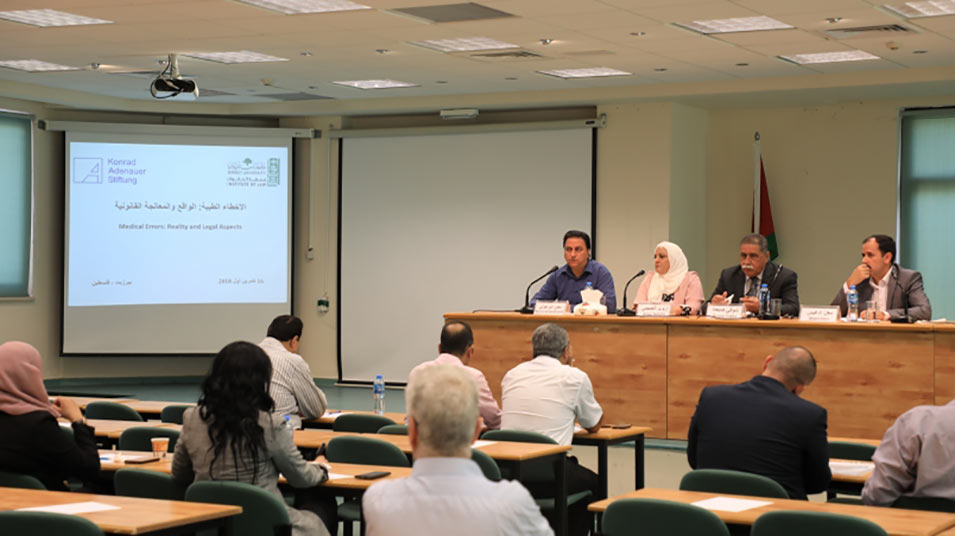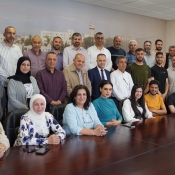Legal encounter explores measures to counter and alleviate rise of malpractice cases
Birzeit University’s Institute of Law, jointly with Konrad Adeneaur Stiftung (KAS)-Palestine, hosted a legal encounter to discuss the increase in medical errors in Palestine’s health system, exploring how the law recognizes and deals with these errors, on October 16, 2019.
The encounter featured legal and medical experts that included Shawqi Sabha, head of the medical syndicate; Arwa al-Tamimi, director of the Legal Affairs Unit at the Palestinian Ministry of Health; and Maen Idais, a legal researcher at the Independent Commission for Human Rights (ICHR).
Mueen Barghouthi, an academic researcher at the Institute of Law, inaugurated the session, stressing the importance of discussing medical errors to be able to come up with an accountability system that protects the rights of patients and doctors while assuring their adherence to responsibilities and obligations.
Sabha defined medical errors and human negligence and explained the standards and regulations for malpractice. He asserted that the reasons behind medical errors include the lack of adequate policies to manage the health system and guide its employees. Sabha stressed that there is an urgent need to establish a medical accountability system in Palestine and that health insurances must provide coverage that allows for the protection of medical practitioners and the compensation of those affected by medical mistakes.
Tamimi talked about Palestinian’s right to health and its legal implications. Explaining the reasons behind the frequent occurrence of malpractice in Palestinian hospitals and other health care institutions, she pointed to the fact that due to the low numbers in the cadre that works in the local health system, the quality of local health care is relatively low. There is a dwindling rate of employment in the health sector due to a lack of skilled workers, she explained.
Tamimi furthermore suggested that a legal entity should be founded and given the capacity to establish an accountability system in order to offset the risks and costs of medical errors.
Regarding a legal framework for Palestinians’ right to health, Idais pointed out that the Law by Decree on Medical Health Protection and Safety No.31 of 2018 has many weaknesses; for example, it does not stipulate that medical malpractice insurance be obligatory for all medical practitioners. The law stresses, however, as Idais pointed out, that Palestinians have the right to receive inclusive and non-discriminatory medical services; it recommends establishing a committee to investigate medical errors in all health institutions and reminds doctors to work according to professional standards.
In conclusion, the attendees highlighted that medical errors in Palestine are on the increase due to a lack of legalists, experts, and investigators who look into medical errors. They also stressed the importance of advancing the law of medical health protection and of enhancing the responsibilities of the official authorities.







